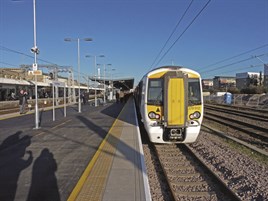Dave Ward is very keen on planning, but not surprises. Meeting Network Rail’s Route Managing Director for Anglia on March 19, RAIL gets that message pretty quickly.
It is also clear that Ward has rapidly built up a good relationship with the new Managing Director of the Greater Anglia franchise, Ruud Haket. Already, they seem to be able to grasp what the other is thinking, and come to the same conclusions.
This is good for the Anglian passengers… and it needs to be! Performance has not been terrible - indeed it rose from 84% to 91% during National Express’ tenure, but things do still go wrong.
Major problems are rare. It may be a train failure, or in one recent case a donkey on the line, but these little problems can have a knock-on effect, resulting in delays to other routes. Many GA trains serve London Liverpool Street, which, despite having 18 platforms, has only six tracks. And they get congested quickly. A late train therefore could cause problems. Several late trains…
RAIL meets Haket and Ward in their office near Shoreditch High Street, a short walk from London Liverpool Street, and just after they posted a joint statement on GA’s website apologising for the poor performance in the first month since Abellio took over.
Yet interestingly, despite the awful weather that blighted its first few days, GA recorded a public performance measure (PPM) of 90.9% - in other words, nine out of ten trains were on time.
Haket explains: “This was borne after the first period. The first two weeks we had were quite bad - we suffered. The second period we were above standard, but then it got bad again.”
Ward chips in: “But do not lose sight of the fact that on one weekday in February PPM was 97.9%. That is incredible for February.”
Ward doesn’t like failure, and certainly will not rest on his laurels. He turned around performance in NR’s Western area when it was performing way below standards a few years ago, and he is now tasked with turning around Anglia.
He explains his plans: “You have to treat passengers as adults and have a mature relationship. If we accept mediocrity, that is what happens. If we have ten good days, but three bad ones, and do not communicate when things go wrong, people will not be happy.”
Haket says which company had the idea to issue the statement is not relevant, while Ward merely says it was important to issue it.
Telling customers what is happening, and informing them of disruption, is part of GA’s plans to improve the passenger experience. However, Haket knows things cannot be changed instantly, and hopes that passengers will understand.
“We cannot change the infrastructure overnight,” he says. “You cannot change reliability overnight. But you can make sure people are spoken to in a different way. Not everyone will do that straightaway. We are writing our communications in a different way. Take the guy who does our Twitter page. When we took over people welcomed him to the job, yet it was the same guy but writing in a different way!
“The best I have heard was when the overhead line equipment (OLE) came down recently at Romford. That trapped a train for two and a half hours. It had no lights either. But the driver was out there helping. It was a four-car train and he walked through to make sure everything was OK. When the train was rescued he didn’t want to go home, he wanted to help. That is where you see something. If the customer service is doing its best, then people will be OK.”
Ward turns to his fledgling relationship with Haket: “I have only been here four or five weeks longer than Ruud. We want to be open and say that ‘bad news is OK, and it is a lot better open - that way there are no surprises’.
“The first conversation we had was ‘what do you want from me?’”
Haket adds: “The most important thing is, looking at alliancing, we need to make sure that customer service and guards do their thing, and make sure that the infrastructure is reliable.
“We have spoken about the overheads and the conversation took 15 minutes. We are looking at contingency planning, control, and recovery arrangements.
“Our first alliance meeting was last week. What we want is clarity, transparency, and to treat passengers as adults. If the wires are down I want to hear in control within two minutes what will happen.”
Ward explains the problem with the OLE, which has caused disruption for around a decade: “The OLE is, in parts to Shenfield and Southend, a 1936 vintage. It was DC current and has had two voltage updates. Its inherent problems are that it started in the 1940s and didn’t have the necessary clearances and performance that is needed now. Two things happen now - it is very susceptible to weather extremes, and it generates defects.
“In 2004/05 an upgrade started. So far Liverpool Street-Stratford is complete and so is around Maryland. We are working on Chelmsford-Ingatestone. The problem is that it emerges as a patchwork quilt. What was the correct access? What was the supply chain and criteria applied? I looked at it in my first week, and thought there would be endless disruption.
“Let’s look at changes, take stock, and work out the appropriate regime. We are committed to all the current work being completed by May, and we are ahead of the programme. Chelmsford-Shenfield will be renewed by June - that is a big plus.”
Haket explains what happens at the southern end of the railway. “We have three single-track railways that are not bi-directional, and 22 trains per hour into Liverpool Street. There are no crossovers on the West Anglia Main Line. If the timetable works, it works really well. If there is a problem, then the PPM is down.
“We need to become more clever, and I have no answer yet. If we do not change tack, trains and infrastructure will fail. You must deal with passenger flows.
“If there is a problem between Tottenham Hale and Bishops Stortford, why is there not a plan in place that sees Stansted passengers taken to Witham and bussed over? Why can’t we be ready? How do we deal with people? How do we inform them?
“Another element is how can one train failure kill off the whole evening peak, both the outers and inners ?
“A strategy must be in place. We have a new control manager, and a big project on contingency and recovery planning.
“The rolling stock is not bad. Are the miles per casualty figures high? No, but delays on rolling stock are too high. It’s about the same for infrastructure. We need to sort it out.”
Ward suggests that delays per incident are actually worse on the West Anglia line than on the Great Eastern section.
“The worst thing to do is play the victim and say it is too difficult,” he says. “What have been the underlying problems? Before the network starts running it has 750 minutes delay to find the root cause. The cause of delays is not capacity.”
Haket chips in with an example. “If a Cambridge ‘fast’ is seven minutes late, it will catch the train in front at Broxbourne. There could be a plan. Do we cancel it at Broxbourne? We shouldn’t say that was a problem, because we know that.
“We need to be proactive. You need to plan actions, though maybe not for PPM. I am not saying I am not interested in PPM, because of course I am. It is good as long as it is in the passenger interest, but have decisions been made with PPM or the passenger in mind? 90% of times it is good for both.”
Ward looks forward at investment: “Look at what is being funded. Look at the Ipswich chord, look at the improvements for the cross-country route at Haughley Junction - it is all great doing that.
“Take Felixstowe. There are 28 trains out of there each day, but locomotives also come out of there for fuel at Ipswich. They use a single line and cross the Great Eastern. Can we put a fuelpoint at Felixstowe? If there is a business case for that, let’s do it.
“We do not have any temporary speed restrictions from Ipswich into London. I sell a product, and if it doesn’t work they have the hump. It shouldn’t get like that. You do not have to force my staff - they are professional, proud railwaymen working for us.
“My challenge is about an ethos. We will not accept mediocrity. If we have a problem to deal with, then we will deal with it. We do not want people to think we will blame them. We can delude ourselves, but if you don’t have the planning…”
Haket believes that his company is in the service business, and as such should act accordingly. “This is the core. The base. We have trains running. I find it amazing that I have been here since 1996, and we accept that a service is given that you would not accept in a shop.
“Take this example. One Sunday night at 0030 we sent a train out with no toilets. You would think one thing a train needs at that time would be a toilet. It takes just a few seconds to think ‘do we need that’, but nobody did.
“It is a customer service world. We have a big problem with capacity that only Crossrail will save with the Shenfields.
“The 0730 from Colchester is at maximum length - I cannot make it any longer, and it is full and standing. Yet if you catch the 0718 EMU there will be seats. So why not colour code the timetable so people know that?
“People want to sit in the first coach, even when there are seats at the back, so we need to tell them where the seats are. We should think like a customer. All frontline staff will have two- to three-day customer service training. It won’t be 1,000 slides - they will be experiencing customer service in a location.”
Haket says he hopes this will improve the service provided by staff, as it should change the culture.
“It is about dealing with it. Understanding. If a passenger is waiting for a train, gets on and is then told there is a detour, staff will have known that was going to happen. That is not what the customer wants.
“The commuter has a choice. I know that. I am a commuter. I will walk to the same carriage. Commuters are predictable, and we need to offer them predictability.”
Ward agrees: “I want infrastructure to be boringly predictable. My people need to release they are a service provider. There are principles to ensure people get their trains. They need to communicate consistently. After six and a half weeks we are further along with that. The underlying problems can be addressed.”
Ward highlights a recent problem to show that a change in culture is already beginning.
“At 1345 on March 16, a technician at Ingatestone saw there was a problem. A wire was frayed. We were renewing the catenary that weekend, so it could have been left for 24 hours. Instead it was discussed how long it would take to repair. Forty minutes was the answer, and it was done in 36. It cost around 400 delay minutes, but I would argue that six months ago it would have been 10,000 delay minutes had it failed.
“There needs to be a knowledge of knowing what is needed, what is available. Look at the weekends - we haven’t suppressed demand, we have destroyed it.”
Haket picks up the thread: “We looked at 2013, where there is a plan for 28 weekend closures and a ten-day blockade at Christmas for the four tracks between Shenfield and London.”
Ward explains the change: “There is now a plan for Ruud to run trains. Maybe we will need one weekend. Looking at 2013 - there were 28 weekends with a four-track blockade. Now we have three.
“The trade-off is we will end up with a regime of night-time work. If you have a four-track railway on a Sunday, then you can run a two-track railway. Shenfield-Colchester work takes place in 2013. That will be agreed, and take Greater Anglia forward. You cannot take a five- to six-year view about plain line renewals and OLE renewal without planning. For the OLE project it can be planned like a production line. That enables me to say you do not need 25 weekends.”
Ward can talk about being able to plan for five to six years, because he has the long-term knowledge that Network Rail is the owner of the railways. Haket, on the other hand, is in charge of a franchise that runs for just 29 months. Surely he cannot think so long-term?
“We have custody of the railway for 29 months. I am not going to do things that will kill off after the 30th month - it is not the Abellio style,” he says.
“We have two and a half years, and it is a grand project. You will see enormous customer service - we will ask what can be done for the infrastructure and rolling stock because that causes delays.
“For further improvements there is a lot around customer information. All staff will get BlackBerrys. We took over Northern in 2004, and in 2005, before everyone had a smartphone, I walked into a station and a passenger walked in and told people that the train was late.
“Every customer now has apps on their phone that can tell them that, but staff don’t. They currently do not know as much as the passenger. That needs to change.”
But surely Abellio has bigger plans for the franchise than merely improving customer service and trying to improve rolling stock reliability?
Haket confirms Abellio will want to go for the 15-year franchise that begins in July 2014, and says: “There are fundamental questions for the ITT . What do we do about capacity on the Great Eastern? What to do about the Essex commuters against the famous Norwich in Ninety campaign? What do we do with ‘315s’ when Crossrail takes over? How do we deal with inter-city stock? Is it an upgrade or replacement?
“There are obvious questions, but until you see the context of the document you do not know. There are stations - Chelmsford, Stratford and Tottenham Hale - that in the long term will be unviable because of capacity.”
Ward concludes: “The good thing about March 16 was that I didn’t have to get involved. As an MD I aspire to that. There is a snowball rolling down a hill here. There are systemic things to fix, and with the 2012 Games it means some things have to be kept spinning.”
You suspect that with these two at the helm, things may just be changing for the better in Anglia.















Comment as guest
Comments
No comments have been made yet.